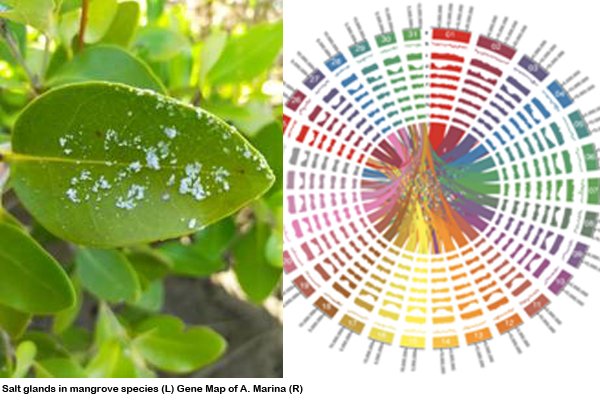New Delhi: Scientists from DBT-Institute of Life Sciences, Bhubaneswar and SRM-DBT Partnership Platform for Advanced Life Sciences Technologies, SRM Institute of Science and Technology, Tamil Nadu for the first time have developed a highly salt-tolerant and salt-secreting true-mangrove species, Avicennia marina. A whole-genome sequence of reference grade is reported.

Mangrove marshes are a unique group of species found in inter-tidal estuary areas and are protected from high levels of salinity through their adaptive mechanisms. Mangroves are an important resource for the coastal region and are of great importance in terms of ecological and economic value. They form a link between marine and terrestrial ecosystems, protect shorelines, and provide habitat for a wide variety of terrestrial organisms.
Avicennia marina is one of the most prominent mangrove species found in all mangrove formations in India. It is a salt-secreting and exceptionally salt-tolerant mangrove species that grows optimally in 75% seawater and tolerates >250% seawater. It is among the rare plant species that can excrete up to 40% of salt through salt glands, in addition to an exceptional ability to exclude salt penetration into the roots.
The study, published in a recent issue of Nature Communications Biology, contains an estimated 462.7 Mb A.A. in 31 chromosomes derived from 88 points and 252 contacts. marina genome comprises 456.6 Mb (98.7% genome coverage). The percentage of the genome in the interval was 0.26%, proving a high-level combination. Collected in this study A. marina genome is almost complete and can be considered as reference-grade genome for any mangrove species reported so far globally and the first reported from India.”
This study employed the latest genome sequencing and assembly techniques and identified 31,477 protein-coding genes and a “Salome”, consisting of 3246 salinity-responsive genes and homologs of 614 experimentally validated salinity tolerance genes. The study reported the identification of 614 genes, including 159 transcription factors that are homologous to genes and were shown to be functionally valid for salinity tolerance in transgenic systems.
This study is also important because agricultural productivity on a global scale is affected by limited water availability and abiotic stress factors such as soil and water salinization. A significant challenge is the availability of water for crop production in arid regions, which account for ~40 percent of the world’s total land area. Salinity globally is 900 million hectares (estimated 6.73 million hectares in India), and is estimated to cause annual losses of US$27 billion. The genomic resources generated in the study will pave the way for researchers to study the potential of identified genes for the development of drought and salinity tolerant varieties of important crop species of the coastal region, which span India’s 7,500-metre coastline and two major island systems. are important for.
About DBT
The Department of Biotechnology (DBT), Ministry of Science and Technology, promotes and promotes the development of the biotechnology ecosystem in India through its extension and application in agriculture, health care, animal science, environment and industry.
About DBT-ILS
The Institute of Biology has a broad vision of conducting high quality multidisciplinary research in the field of life sciences. Its goal is the holistic development and advancement of human health, longevity, agriculture and the environment. The stated mission of the organization is to work towards the upliftment of human society and to create skilled human resource for future India.
